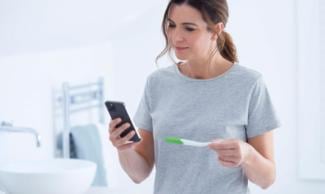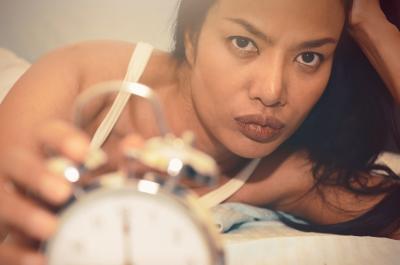
Just like anything new in life, menopause can also come with its challenges. Except, in this case, the challenges can be present as uncomfortable symptoms that can affect your general wellbeing or even health. While your healthcare professional may provide medical intervention that can help when needed, such as hormone replacement therapy (HRT), you can also make some lifestyle changes that can make this time of life go more smoothly.
Exercise regularly
We all know that exercise is essential for a healthy life, and as you age, even more so. Need a little motivation? Well, here are a few reasons why it’s a good idea to exercise as you approach menopause1:
- When you turn 30, your body starts to lose 1% of muscle mass each year, so pick up some dumbbells and take up weight training to help you build and keep muscle.
- Weight and resistance training has the added benefit of strengthening bones, which can help prevent osteoporosis, a skeletal condition you are more at risk of once you’ve hit menopause.2
- If you’re feeling stiff, then stretching or yoga can help your muscles and tendons feel more supple.
- Help keep your heart strong by including some cardiovascular activities such as brisk walking or jogging.
- Lift and boost your mood with some exercise, which is known to help with anxiety and depression. This is believed to be because physical activity triggers various physiological and biochemical changes in the body such as the release of endorphins which can improve mood.3
- You’ve heard this one a number of times, but it’s a cliché cause it’s true: Exercise helps manage weight gain.
Give your body what it needs by adding both cardiovascular activities, like brisk walking or jogging, and weight and resistance training to your exercise regimen.
Follow a healthy diet
You may find that it’s easier to gain weight around menopause, and while exercise is great, you can’t outrun a poor diet, so here are a few tips for your diet around menopause4:
- Consider eat fewer calories per day than you did before entering menopause.
- Go for more fruit, vegetables, whole grains, and fiber.
- Try to cut back on red meat and add more legumes, nuts, soy, and fish to your diet.
- Substitute butter and margarine with healthy oils, like olive oil.
- Add low-fat dairy products like yogurt or green, leafy vegetables to get the calcium you need for your bones.
- Cut back on sugar.
Excess body fat can also increase incidence of hot flashes, so switching to a healthy diet could help with some of your menopausal symptoms. You may also want to avoid spicy food, which can trigger night sweats and hot flashes.5
Get some sunlight
Getting some sunlight on your skin triggers the production of Vitamin D, which along with calcium, is an important nutrient that helps keep your bones strong and helps against osteoporosis.6 Don’t forget your sunscreen!
Cut down on smoking and alcohol
We all know the health risks that come with smoking, but did you know that cigarettes can increase hot flashes?7 Alcohol may also trigger hot flashes, though the research in this area is conflicting. While there have been studies showing alcohol use increase the risk of hot flashes in pre- and postmenopause women, it was found that it lowers the risk in perimenopause women.8 To determine if alcohol is a personal trigger for you, you may wish to track your symptoms.
Kegel and pelvic floor exercises
You might want to try Kegel and pelvic floor exercises if you have pelvic or vaginal pain during sex. In fact, you may want to do these anyway, as they can also help with urinary incontinence.9 Kegel exercises involve contracting and relaxing muscles in your pelvic floor. It can be difficult to identify the right muscle but one way to identify is with the basic move of stopping urine midstream while urinating. Aim to hold for 2 seconds then release and repeat 5-10 times. Talk to your healthcare professional for more guidance.
When to see your healthcare professional
If you notice any symptoms that cause you concern, or interfere with your life, then see your healthcare professional who should be able to give you advice not just on lifestyle changes, but may also recommend specific treatments for certain symptoms to help you get through the menopause journey.
This article does not constitute medical advice and cannot be interpreted as such. In case of pain or any medical need, always consult a healthcare professional.
- http://www.menopause.org/for-women/menopauseflashes/exercise-and-diet/fitness-after-40-building-the-right-workout-for-a-better-body (accessed 3rd May 2023)
- https://www.nia.nih.gov/health/osteoporosis (accessed 4th May 2023)
- Mikkelsen, K., Stojanovska, L. et al., (2017). Exercise and mental health. Maturitas, 106, 48–56. https://doi.org/10.1016/j.maturitas.2017.09.003
- https://www.mayoclinic.org/healthy-lifestyle/womens-health/in-depth/menopause-weight-gain/art-20046058 (accessed 3rd May 2023)
- http://www.menopause.org/for-women/menopauseflashes/menopause-symptoms-and-treatments/breast-cancer-survivors-hot-flash-treatments (accessed 3rd May 2023)
- https://www.menopause.org/for-women/menopauseflashes/bone-health-and-heart-health/frax-sup-sup-a-tool-for-estimating-your-fracture-risk (accessed 4th May 2023)
- Butts, S. F., et al., (2012). Joint effects of smoking and gene variants involved in sex steroid metabolism on hot flashes in late reproductive-age women. The Journal of clinical endocrinology and metabolism, 97(6), E1032–E1042. https://doi.org/10.1210/jc.2011-2216
- Schilling, C., Gallicchio, et al., (2007). Current alcohol use, hormone levels, and hot flashes in midlife women. Fertility and sterility, 87(6), 1483–1486. https://doi.org/10.1016/j.fertnstert.2006.11.033
- http://www.menopause.org/for-women/sexual-health-menopause-online/effective-treatments-for-sexual-problems/yoga-kegel-exercises-pelvic-floor-physical-therapy (accessed 3rd May 2023)

What’s your menopause stage?
The menopause journey has stages. Learn about yours with Clearblue® Menopause Stage Indicator – 5 easy-to-use tests & a FREE app.

Is Clearblue® Menopause Stage Indicator right for me?
Take our simple quiz to find out if Clearblue® Menopause Stage Indicator is suitable for you



